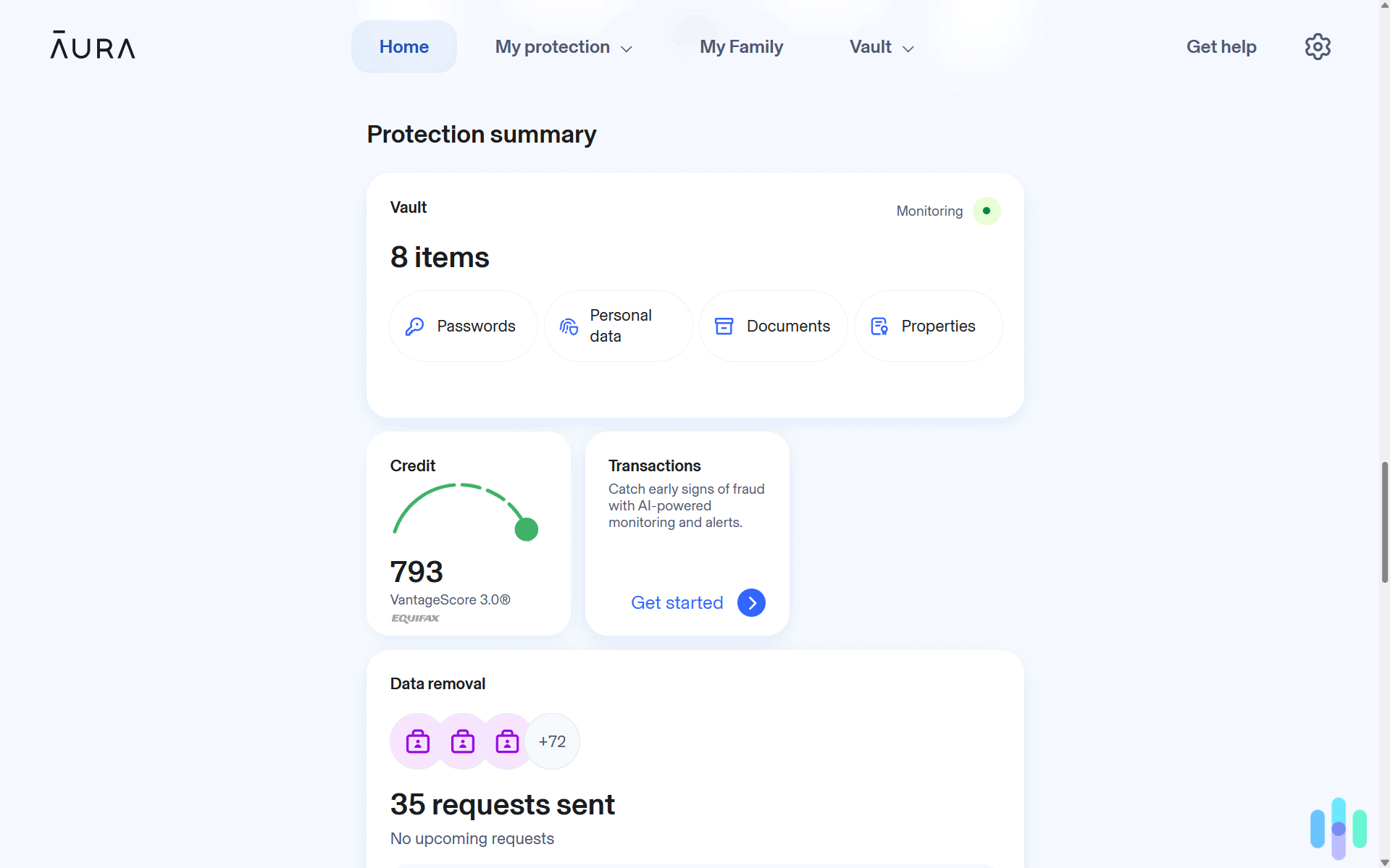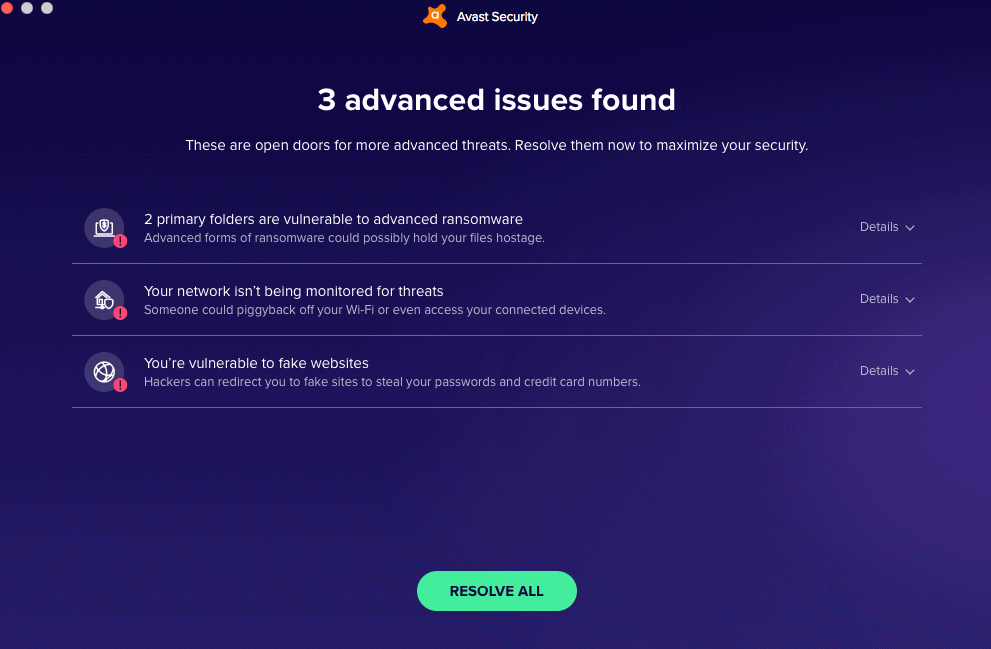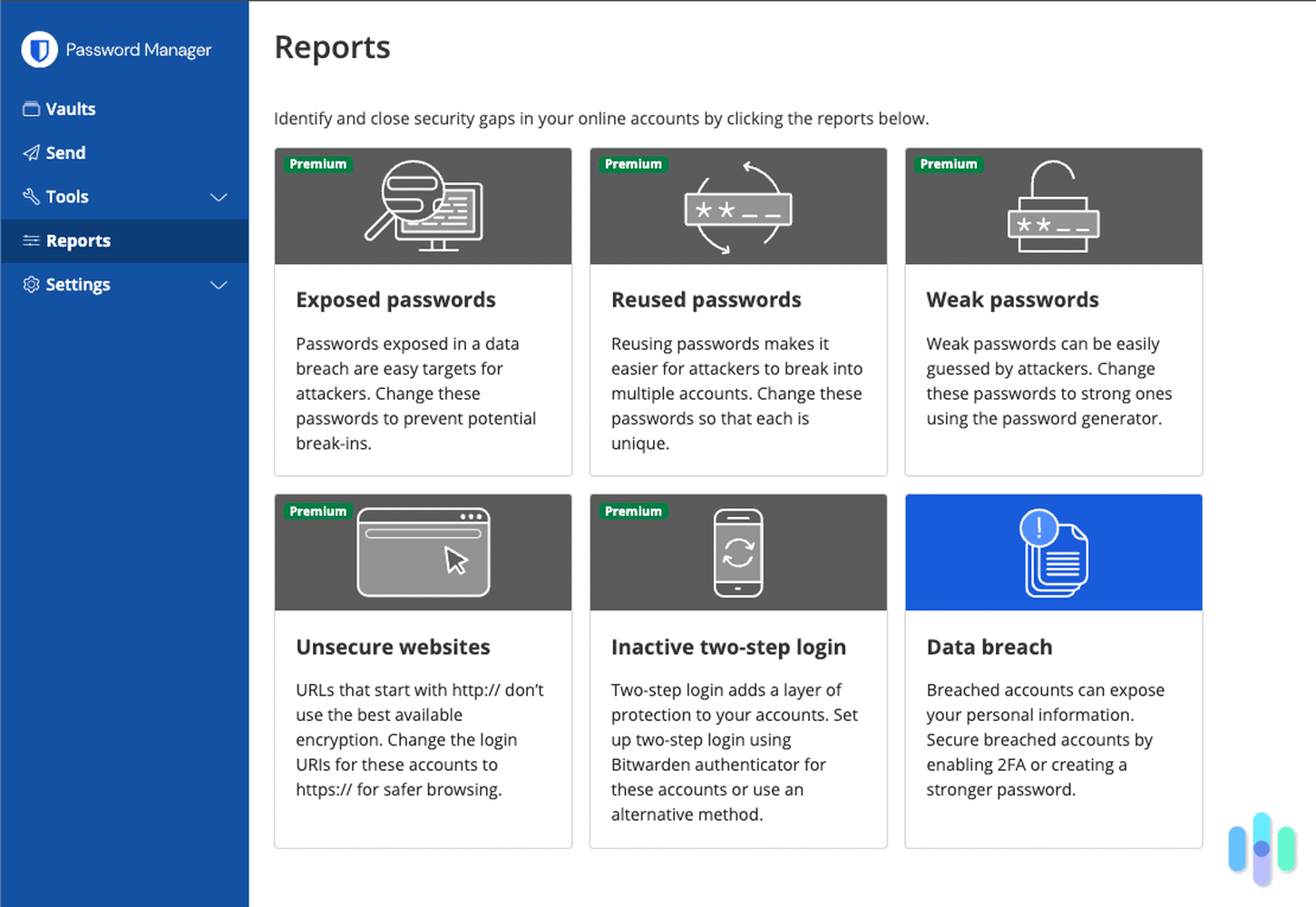Webroot Antivirus Review
 Aliza Vigderman, Senior Editor, Industry Analyst
&
Aliza Vigderman, Senior Editor, Industry Analyst
&
 Gabe Turner, Chief Editor
Last Updated on Oct 23, 2025
Gabe Turner, Chief Editor
Last Updated on Oct 23, 2025
What We Like
- Fast and efficient antivirus scans
- By default, automatically scans once an hour
- Firewall protection included, standard
What We Don't Like
- Low virus detection score from AV Labs
- Functionality involves moving back and forth between app and website
- Only detected one of our five test viruses
Bottom Line
We’ll be straight with you about Webroot. After spending weeks testing it on a MacBook Pro, we’ve got mixed feelings. On one hand, those lightning-fast scans that took 22 minutes had us impressed. Most competitors take nearly an hour. Unfortunately, speed doesn’t mean much if you’re missing threats.
>> Related: Compare Webroot vs Norton
The real concern showed up during our virus detection tests. We planted five malware samples on our test machine, and Webroot only caught one. That 20 percent detection rate is not exactly inspiring confidence. Recent independent testing backs this up too. Let’s dive into our hands-on testing of Webroot antivirus to find out.
Webroot Antivirus Features
| Price range | $2.50 to $6 per month |
|---|---|
| Scan types | On-access, On-demand |
| Blocks malware and viruses | Yes |
| Blocks phishing | Yes |
| Password manager | Yes |
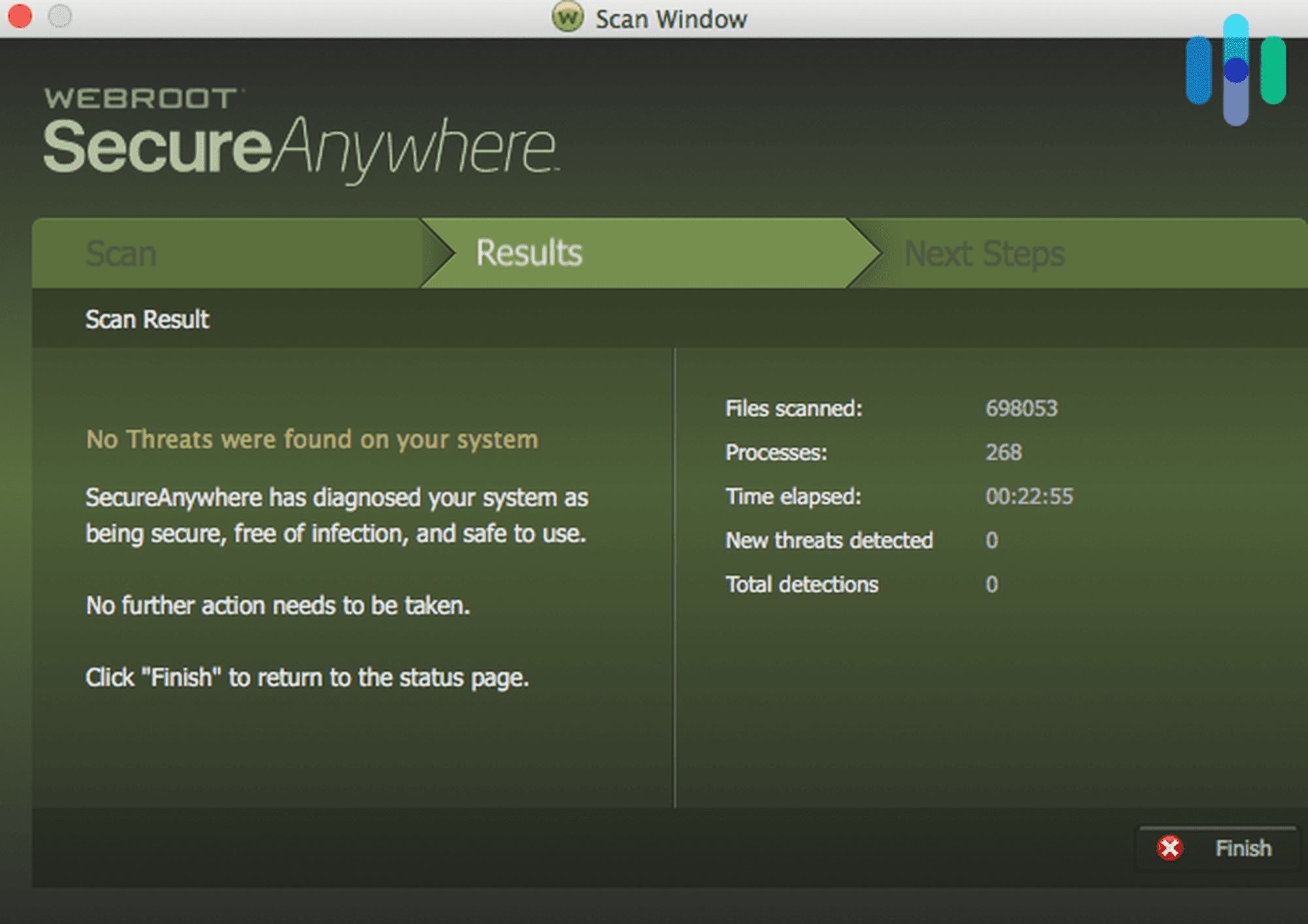
- Detected 98.9 percent of widespread malware as of June 2020
- 14-day free trial
- 70-day money-back guarantee
Webroot Antivirus Overview
The standout feature of Webroot is definitely its scanning speed. In our tests, it consistently finished full system scans faster than most competitors we've reviewed. Unfortunately, according to recent independent tests, Webroot has a low detection rate for zero-day malware attacks. If you're looking for more reliable alternatives, here are some top-rated options:
Webroot’s Security Breach: Are You Protected?
When you’re trusting a company with your cybersecurity, their own security track record matters. We always dig into this stuff because, let’s face it, if they can’t protect themselves, how can they protect you?
Even cybersecurity companies can become targets themselves. Webroot fell victim in 2019 when hackers exploited their systems and spread ransomware to some customers.1 The company responded quickly by implementing mandatory two-factor authentication and contained the breach effectively. This minimized the impact of the breach.
We also reviewed Webroot’s privacy policy to understand what data they collect and how they handle it. Like most antivirus providers, they collect standard information including:
- Contact and account registration: Name, billing and shipping addresses, type of business, email address, phone number, security code, username.
- Financial and transactions: Card, banking or payment information, product and transaction information, purchase history.
- Content we provided: Any information in customer cloud storage
- Devices: Operating system, MAC address, device ID, browser type, IP addresses, websites visited, location information.
- Connecting and usage: License and account information, features utilized, session length.
- Misc: Any communications we have with Webroot, etc.
Webroot is transparent about not selling personal data to third parties, which we appreciate. They might share some anonymized data for advertising analytics, but you can opt out through your browser settings. Overall, we find their data handling practices reasonable and transparent.
Webroot’s Software and How It Performed
Time to get into the nitty-gritty of what Webroot actually does on your machine. We tested every feature extensively, and here’s what stood out.
How Webroot Protected our Macbook Pro
- Realtime Shield: Webroot used behavioral analysis to spot suspicious activity, not just known malware signatures. During testing, it ran quietly in the background without any noticeable performance hit. We find that that’s always a plus when you’re trying to get work done.
- Web Threat Shield: Webroot also checked websites we visited against a cloud database of over 200 million known malicious domains and IPs. It’s updated in real-time, which is crucial since new phishing sites pop up every few seconds these days. Since we’re careful about avoiding suspicious phishing links, Webroot didn’t need to block anything during our Chrome browsing sessions.
- Quarantine: If Webroot had found any viruses or malware on our computer, they would’ve “quarantined” them in this folder, protecting the rest of our computer from these cyber threats.
Note: Webroot’s software monitored our computer for suspicious behavior, not just signatures that are already known to be malicious in established databases.
Our Experience Using Webroot
Webroot started scanning our MacBook immediately after installation — fortunately, it came up clean. That initial scan took just 22 minutes, and subsequent scans were even faster at around 15 minutes. Compare that to Norton’s 45-minute average or McAfee’s hour-long marathons, and you’ll see why we were impressed.
What really stood out was the automatic hourly scanning schedule. We think this aggressive scanning approach is smart. Most malware tries to establish itself quickly, so frequent checks can catch threats before they dig in deep. Even better, these background scans used less than 5 percent of our CPU, so we could keep working without those annoying slowdowns. The included firewall protection was another nice touch that many budget antivirus options skip.
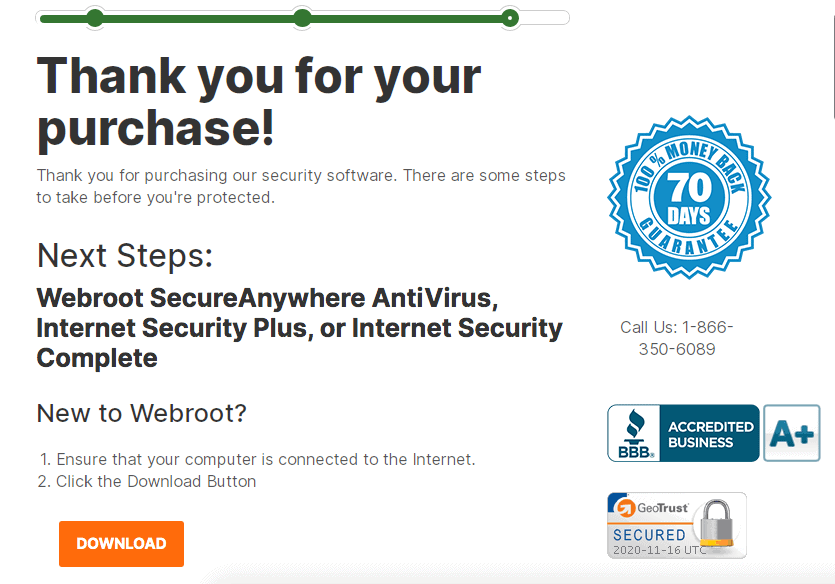
Overall, the Webroot app was lightweight and easy to use. The interface feels modern and intuitive. We didn’t find it dated and clunky like we usually see with some legacy antivirus programs. Everything loads instantly, and finding features doesn’t require digging through endless menus.
The main usability issue we encountered was the split functionality between the desktop app and web portal. Want to check your subscription status? That’s on the website. Need to manage multiple devices? Website again. The web and desktop apps were functional, but it was annoying having to constantly switch between them.
Did Webroot Detect Viruses and Malware?
To test, we loaded five pieces of malware into our laptop and ran a scan. Of the five we hid, Webroot found just one. That’s a 20 percent detection rate, which isn’t exactly reassuring.
Our findings align with recent independent testing results. AV-Test’s tests on Webroot show protection scores lower than the industry average.2 In their last test, it detected only 67 percent of zero-day malware attacks (industry average was 97.1 percent) and 98.9 percent of prevalent malware. Those results are alarming. For context, top performers like Norton and Mcafee consistently hit 100% in these same tests.
The pattern is clear: Webroot sacrifices detection accuracy for speed. It’s like having a really fast security guard who misses a third of the intruders – not exactly the trade-off you want.
Navigating Webroot: Our Experience
Although Webroot’s virus and malware detection were lacking, we did appreciate its user experience, which was pretty seamless in our opinion.
Downloading Webroot
We grabbed the basic antivirus plan for $29.99 annually (single device), but if you have multiple devices, the three-device plan at $39.99 is what we recommend. The purchase and installation process was refreshingly straightforward — no complicated installer apps or confusing setup wizards. Within three minutes of payment, we had Webroot running its first scan. Compare that to some competitors that require multiple reboots and configuration steps, and you’ll appreciate the simplicity.
Identity Protection
The next section was Identity Protection, which only included one feature called Web Threat Shield. It works in the background and blocks fraudulent websites designed to steal your personal information. Like we mentioned earlier, when we intentionally visited a known phishing site, it warned us before connecting us to the site.
Backup & Sync
If you’ve ever experienced a computer suddenly crashing, you know how disheartening losing all your files can be. The Total Protection plan at $89.99 annually includes unlimited cloud storage for one PC or Mac. It creates a regular backup of all your device’s files. That way, you can restore any lost files due to corruption, device failure, or any other reason.
Password Manager
Webroot’s password manager, included in all plans, is powered by LastPass. The integration process from the Webroot app felt clunky, ultimately leading us to a Chrome extension and an additional charge. Ironically, we already had a LastPass subscription, but the Webroot bundle would have been more cost-effective. Better communication about these bundled savings upfront would be helpful.
>> Compare: Lastpass vs. Nordpass
Utilities
Under Utilities, we saw two buttons: Manage Active Processes and Reports. The Active Processes view is actually pretty cool. It shows every running program and whether Webroot trusts it. Think of it as a behind-the-scenes look at what your computer’s doing. The Reports section keeps detailed scan logs, which is handy for troubleshooting or just satisfying your inner data nerd.
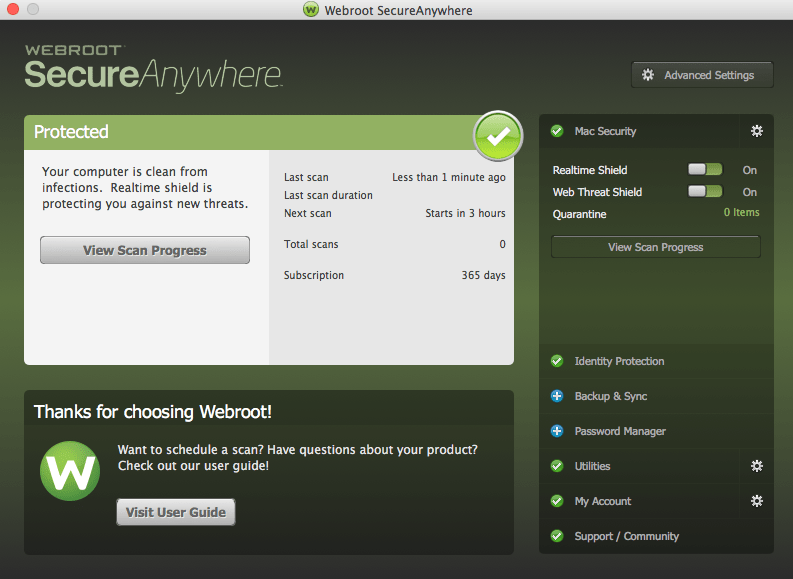
My Account
The Webroot app didn’t have all of its functionality built-in; rather, many features, like the password manager, required us to open the Webroot website. This section basically serves as a portal to the web console, where you’ll manage subscriptions, add devices, and handle billing. It’s functional but feels like a missed opportunity for a more integrated experience.
Support/Community
Last but not least was Support/Community, which included buttons to contact customer support and speak in user forums.
Webroot Costs
Webroot’s pricing structure hasn’t changed much, which is both good (no surprise increases) and bad (no new value additions). Here’s the current breakdown:
| Maximum Number of Devices and Contract Lengths | Price |
|---|---|
| 1 device, 1 year | $29.99 |
| 1 device, 2 years | $49.99 |
| 1 device, 3 years | $69.99 |
| 3 devices, 1 year | $39.99 |
| 3 devices, 2 years | $69.99 |
| 3 devices, 3 years | $99.99 |
If you’re interested in protecting your identity, Webroot Premium now includes enhanced identity monitoring powered by Allstate Identity Protection. This upgrade brings dark web monitoring, social media reputation management, and up to $1 million in identity theft insurance.
FYI: While the Internet Security Plus plan adds a password manager to the Antivirus Plan, Internet Security Complete adds protection against tracking plus 25 GB of cloud storage.
Webroot App
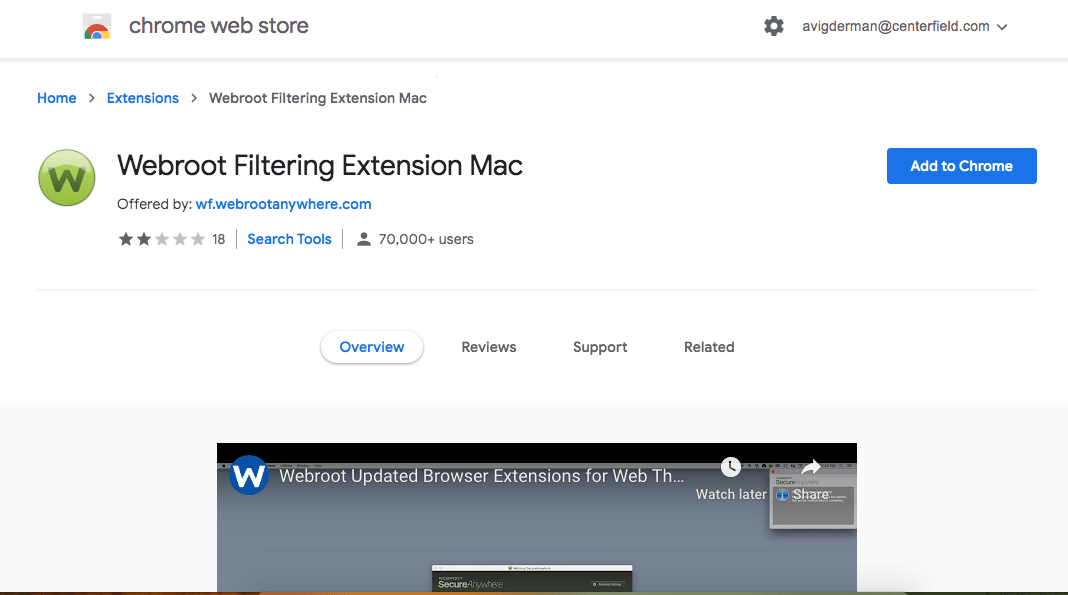
We tested Webroot on our MacBook Pro, but they also offer mobile protection through iOS and Android apps. Note that they’re branded differently on each platform:
- iOS: Webroot WiFi Security & VPN
- Android: Webroot Mobile Security & Antivirus.
Just like most users, we had a lackluster user experience with the mobile apps. On Android, we noticed compatibility issues with tablets. Our iPhone experience wasn’t as bad, but it asked us to sign back in at least once a week. That quickly got annoying. If mobile protection is a priority, you might want to consider alternatives.
Customer Support
There were a few ways for us to contact Webroot’s customer support, including creating an online ticket, send them a message, calling them on the phone or simply checking out their online help center. While we wish they had live chat as well, we found their support page to be pretty clearly laid out and extensive.
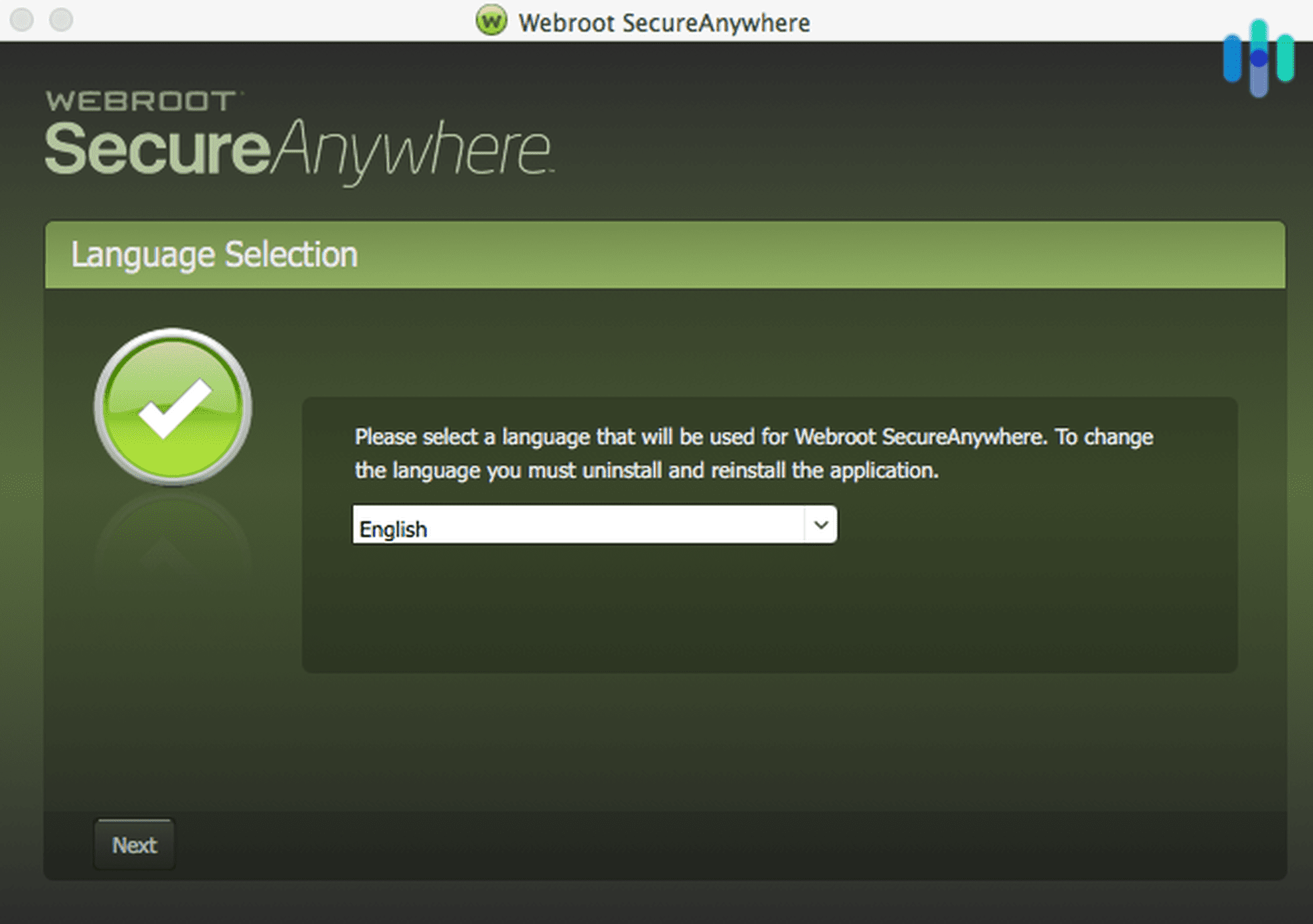
Our Webroot Research and Data
The following is the data and research conducted for this review by our industry-experts. Learn More.
Encryption
| In Transit | Yes with certain products |
|---|---|
| At rest? | Yes with certain products |
| All network communications and capabilities? | Yes with certain products |
Security Updates
| Automatic, regular software/ firmware updates? | Yes |
|---|---|
| Product available to use during updates? | Yes |
Passwords
| Mandatory password? | Yes |
|---|---|
| Two-Factor authentication? | Yes |
| Multi-Factor authentication? | Yes |
Vulnerability Management
| Point of contact for reporting vulnerabilities? | Submit a report through the portal |
|---|---|
| Bug bounty program? | Vulnerability disclosure program that may include reward |
Privacy Policy
| Link | https://www.webroot.com/us/en/legal/privacy |
|---|---|
| Specific to device? | Yes |
| Readable? | Yes |
| What data they log | Name, mailing address, email address, telephone number, payment information, IP address, browser information, browsing history, operating system information, login information, website usage information, potentially malicious files, and cookies. |
| What data they don’t log | n/a |
| Can you delete your data? | Yes |
| Third-party sharing policies | Shares information with third parties. |
Surveillance
| Log camera device/ app footage | n/a |
|---|---|
| Log microphone device/ app | n/a |
| Location tracking device/ app | Yes |
Parental Controls
| Are there parental controls? | No |
|---|
Company History
| Any security breaches/ surveillance issues in past? | Yes |
|---|---|
| Did they do anything to fix it? | Yes |
Additional Security Features
| Anything like privacy shutters, privacy zones, etc.? | Can opt out of sharing potentially malicious files |
|---|
Summary
We found during our tests that Webroot is fast and lightweight, so it won’t bog down your system. Those are all genuine positives. But when it misses 80% of test malware and scores poorly in independent labs, those benefits feel hollow.
The 67 percent zero-day detection rate is particularly troubling when new malware variants appear every few seconds. If Webroot can boost their detection rates to match industry standards while keeping that impressive speed, they’d have a winner. Until then, we’d recommend looking at alternatives like Norton, Aura antivirus, and TotalAV, which have outperformed Webroot in most tests.
For budget-conscious users who practice safe browsing and want a lightweight backup to Windows Defender, Webroot might work. But if you’re looking for comprehensive protection you can trust, your money’s better spent elsewhere.
-
MSSP Alert. (2019). Hackers Hit MSP Software to Launch Ransomware Attacks.
msspalert.com/cybersecurity-breaches-and-attacks/ransomware/hackers-hit-msp-software/ -
AV-Test. (Retrieved 2025). Webroot.
https://www.av-test.org/en/antivirus/home-windows/manufacturer/webroot/





